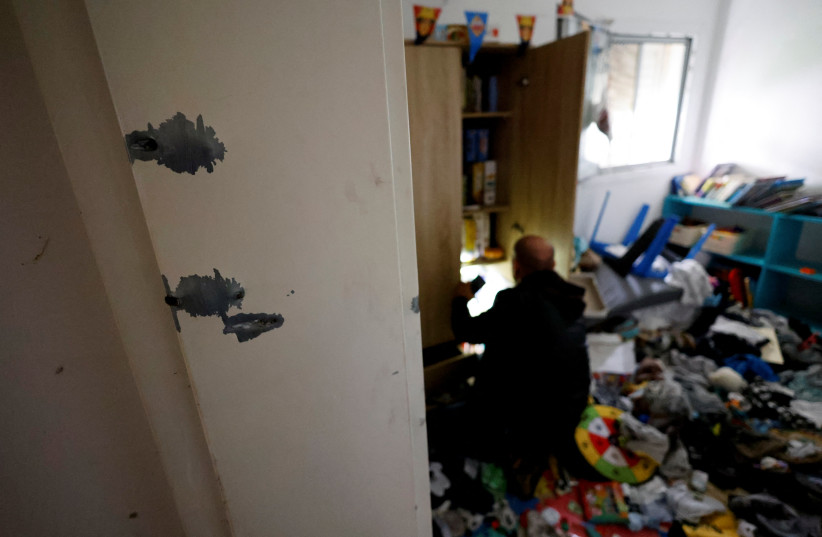PAPHOS, Cyprus – Immigration to Israel has increased from several countries in response to a wave of antisemitism and the October 7 massacre, according to a Sunday Immigration Ministry report and a Wednesday interview with Ofek Israeli CEO Arie Abitbol.
Abitbol told The Jerusalem Post at the Yael Foundation Conference in Paphos that since October 7 aliyah from France had increased by 237% and 85% from the United States of America. The Aliyah and Integration Ministry said on Sunday that Jewish Agency data showed that since the beginning of the war, there had been a 300% increase in the opening of immigration case files in France, over 100% in the US, 150% in Canada, and 40% in the United Kingdom.
A total of 7,000 new immigrants had arrived since October 7, including those seeking to enlist in the IDF and the parents of fallen soldiers.
Abitbol, whose company promoting aliyah is an initiative of the World Zionist Organization and Jewish Agency and is funded by the Aliyah Ministry, said that there was both a “push and pull” effect at play.
In France antisemitism was a pushing factor, said Abitbol, with a historical 1,800 acts of antisemitism in the country since October 7. The pulling factor was the increased connection to Jewish identity.

Task forces designed to help immigration in wake of attacks
Ofek Israeli was formed in 2015 in the wake of the 2015 Paris terrorist attacks, and the 2014 Crimea Crisis to help French, Russian, and Ukrainian Jews come to Israel.
Since the Israel-Hamas War began, however, aliyah from Ukraine had decreased by 70%, said Abitbol. The numbers have slightly improved in the last month, rising to a 56% decrease. Abitbol expects the trend to continue, and that as events in Israel normalize, the numbers will normalize.
“People are in a war, they don’t want to go to another war,” explained Abitbol.”They want to wait and see.”
SOUTH AFRICA has also seen an increase in immigration according to Abitbol, with the spike in aliyah coinciding with the country’s petitions against Israel to the Hague International Court of Justice.
Addressing concerns that the spat could lead to the potential closing of Israel’s embassy in South Africa and interfere in aliyah, Abitbol said that he didn’t think it would be an issue as long as there were services from consulates.
“More problematic from April is no direct flights to Israel,” said Abitbol, referencing El Al’s cancellation of operating flights to and from South Africa.
It’s an issue because flying is expensive and could impact the decisions of families.
Abitbol gave a lecture at the Yael Foundation Conference for enhancing Jewish education in the diaspora, arguing that out of the tragedy of October 7, they had an educational opportunity.
“October 7 has provoked an awakening of Jewish identity,” Abitbol told the Post. “Before October 7 I was very pessimistic about the bridge between youths in the diaspora and Israel.”
He noted that their grandparent’s defining event for Jewish identity and connection to Israel was the 1967 war, and October 7 may be a defining moment for this Jewish generation. He cited the many delegations, many volunteers, seminars, and fundraising that had grown out of the war.
At universities some Jewish youth feel ashamed about their identity or try to hide it due to peer pressure, said Abitbol.
“We have to give tools of Jewish history and tradition to cope with this issue,” he said. “Hasbara is not only about being an ambassador for Israel, but is also to strengthen Jewish identity.”
Abitbol said that trips to Israel have worked for 75 years and will continue to work, but they need to be adapted to the new generation. He noted one successful program by Masa and Ofek Israeli that brought diaspora volunteers to replace reservists in the workplace while they were off fighting a war. This was real economic support, he said.
He advised organizations to increase seminars on how to speak about Jewish identity to embassy staff and influencers. Hundreds of people in France have come to such lectures, he said.
“I think we need to explain aliyah’s positive aspects, not just the ‘push effect’ – it needs to be about the dream.”
He encouraged those interested in starting the aliyah process to ask questions, taking small steps like signing up for Hebrew lessons. A lot of people are intimidated by everything involved in aliyah, Abitbol said, but there are many solutions. He said that while in the past you had to abandon work if you immigrated to Israel, one can now work remotely.
Integration Minister Ofir Sofer said on Sunday that the government had approved NIS 170 million for a program to encourage aliyah and absorption.
